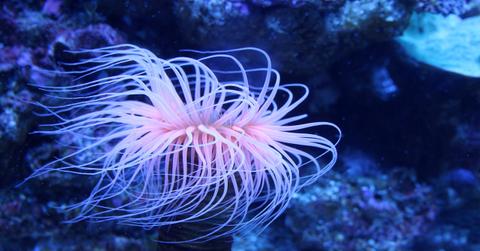Scientists Built A Robotic Fish Designed To Explore Coral Reefs
Marine exploration is limited by human capabilities to access small spaces, and approach animals in their natural habitat without disturbing them. An innovative design presents a practical solution—make the camera the size and shape of a fish.
Updated May 21 2019, 5:11 p.m. ET
On Wednesday, researchers at MIT's Computer Science & Artificial Intelligence Lab introduced the word to SoFi, a robotic fish that has the capabilities to dive, explore, and record her adventures underwater. According to Inverse, those adventures will mainly be charting coral reefs and caverns that can't be easily approached by people. SoFi isn't just designed to look like a fish to be cute—scientists want to observe the marine life the robot encounters when they're acting as naturally as possible, and have been struggling to find a way to introduce unobtrusive equipment into the environment.
It's camouflage.
SoFi is just one fish for now, but the dream is to have a number of fish that are all searching the ocean at once, and connecting with one another as they explore, according to Robert Katzschmann, the Ph.D. candidate who has taken the lead on the project.
“You can start duplicating and make several of these robotic fish to use them almost like a network of sensors and cameras,” Katzschmann explains. “The prototype was designed to go as deep as a beginner human diver, so around 60 feet. You would need to use different materials to encase some of its [machinery] but that’s an engineering question that is completely feasible to take it much deeper than what we’ve done so far.”
But SoFi is also unique in the way it travels. Usually, "autonomous underwater vehicles," or AUVs, are tethered to a boat or powered through the water by propellers. That limits the directionality of their movement. SoFi has a tail that allows it directional power. It can dive, surface, go in a straight line or turn, according to MIT News, and is considerably more lightweight than most AUVs. Parts of SoFi are 3D printed, and the entire back half of the fish is made from silicone rubber and flexible plastic.
“To our knowledge, this is the first robotic fish that can swim untethered in three dimensions for extended periods of time,” says Katzschmann. “We are excited about the possibility of being able to use a system like this to get closer to marine life than humans can get on their own.”
Eventually, they'd like an internal camera to direct SoFi to follow fish automatically.
“We can use SoFi as an underwater observatory of marine life,” says Katzschmann. “The biomimicry that’s built into [SoFi’s] propulsion mechanism gives it the potential to mimic a real fish rather easily. With that you can start setting up studies to not only observe but also to interact with fish in their natural environment, not just in an aquarium. This will give scientists the ability to examine a variety of other effects that couldn’t be considered as long as they were living in a tank.”
SoFi has been on a few test dives, going as deep as 50 feet near Rainbow Reef in Fiji, and staying underwater for as long as 40 minutes. The robot seemed to hand the ocean currents well, and used its fish-eye lens to take photos of its surroundings. Researchers built a waterproof Super Nintendo controller to give SoFi directions.
The tests have shown Katzschmann and his team that there's still work to be done on SoFi, but the fish has real potential as a tool for marine scientists.
